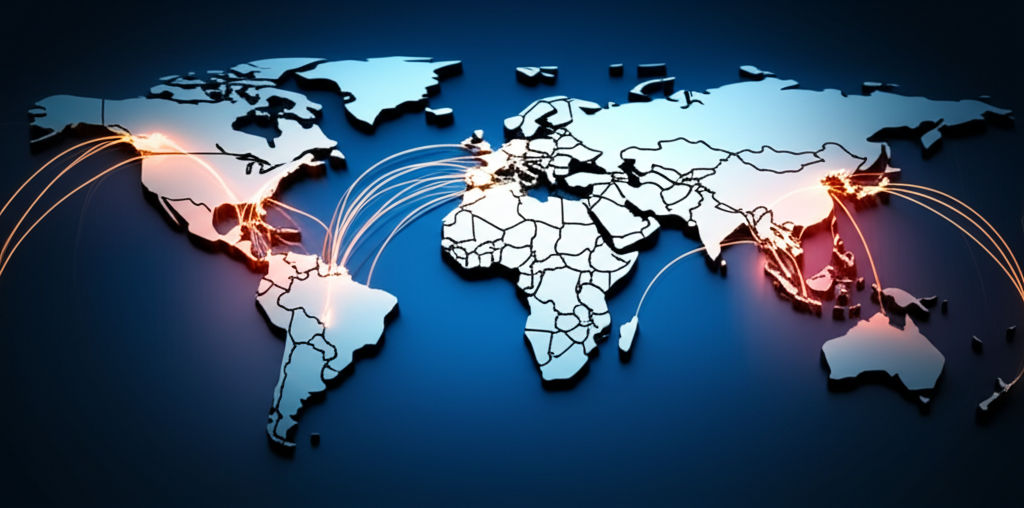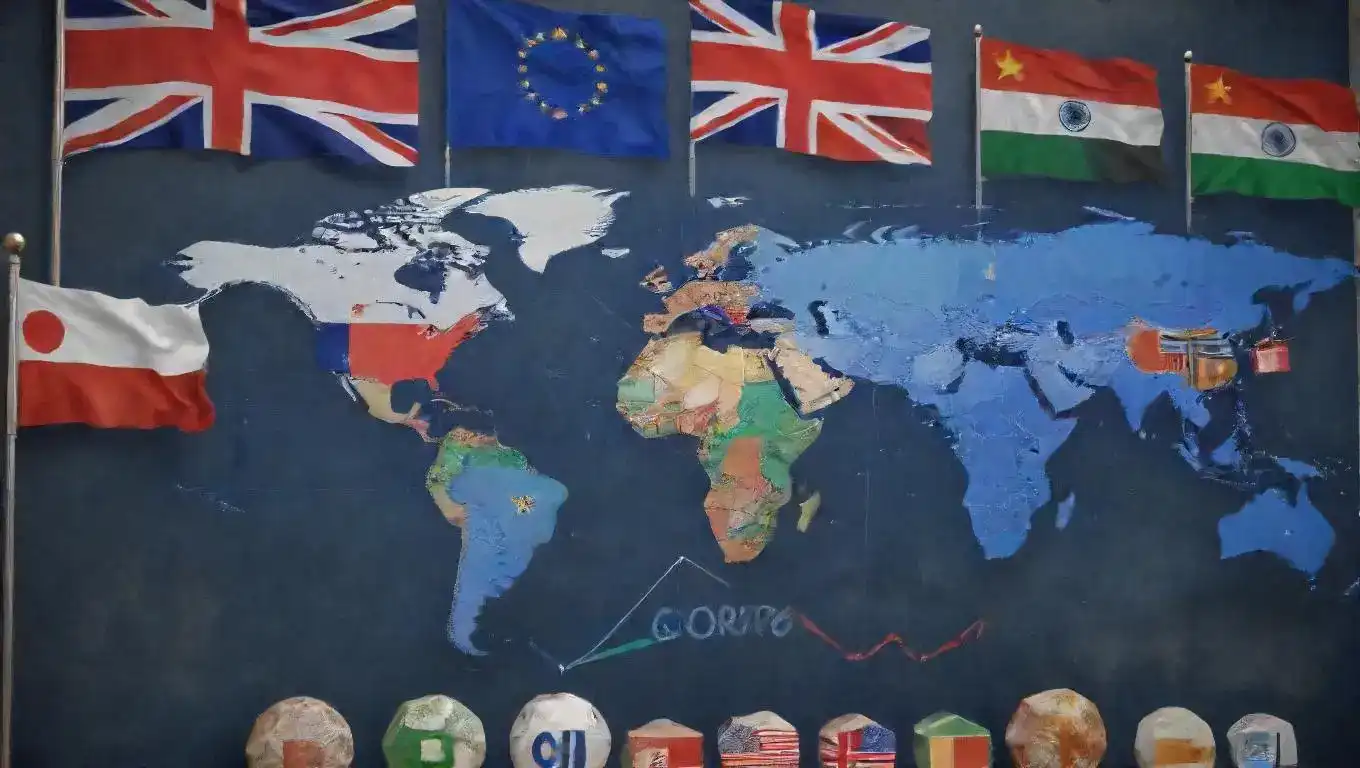Geopolitics Redraws Global Economic Map
Emily Willis

Photo: Geopolitics Redraws Global Economic Map
Geopolitics Redraws the Global Economic Map: Navigating a New Era of Interconnectedness and Competition
The world's economic landscape, long shaped by the forces of globalization and interconnectedness, is undergoing a profound transformation. At the heart of this shift lies geopolitics – the intricate interplay of geography, power, and international relations. Far from being a distant concept, geopolitical shifts are actively redrawing the global economic map, impacting everything from supply chains and trade routes to investment flows and energy security. Understanding these dynamics is no longer a niche concern for policy wonks; it is a critical imperative for businesses, governments, and individuals alike.
Less than a decade ago, the global economy was largely defined by an ambitious free-trade system designed to open new markets. However, geopolitical rivalries, alliances, and aspirations are now becoming the defining forces, dramatically rewiring the global economy. This article will delve into how these powerful forces are reshaping our economic reality, offering insights and actionable steps to navigate this new, complex environment.
The Shifting Sands of Power: A New Global Order
For decades, the global order was largely unipolar, dominated by the United States. Today, we are witnessing the emergence of a more multipolar world, with new powers like China and India asserting greater influence. Regional blocs, such as the European Union (EU) and ASEAN, are also playing increasingly significant roles in shaping global norms and standards. This diversification of power centers means that multinational corporations can no longer solely follow Western-led rules but must adapt their strategies to align with a wider variety of regulatory, cultural, and political landscapes.
This shift is not merely about political influence; it has direct economic consequences. For instance, the G20 summit in 2023 underscored India's growing importance as a diplomatic and economic player, reflecting a broader trend where middle powers like Türkiye, Brazil, and Saudi Arabia are stepping into more prominent roles. This evolving power dynamic often leads to increased competition and, at times, cooperation, forcing countries and companies to strategically reassess their allegiances and dependencies.
Trade Wars and Tariffs: Reshaping Global Commerce
One of the most visible manifestations of geopolitical tensions is the rise of trade wars and protectionism. Geopolitical disputes frequently escalate into trade wars, where countries impose tariffs and other trade barriers on each other's goods. This directly increases the cost of imported goods, making them less competitive and potentially reducing trade volumes between the nations involved. The ongoing trade tensions between the United States and China, for example, reflect a broader geopolitical rivalry, with the US imposing tariffs on Chinese goods and China retaliating with its own.
These trade conflicts have significant geopolitical implications, shaping the global political order and influencing the behavior of other countries. While economic coercion can be a tool to influence behavior, it also carries the risk of unintended consequences, such as retaliatory measures and destabilization of global markets. A striking result of empirical research suggests a declining utility of unilateral US economic sanctions, with only 13% achieving foreign policy goals since 1970, and costing the US an estimated $15 billion to $19 billion annually in potential exports. Despite this, sanctions remain a frequently used foreign policy tool.
The impact of these trade barriers is far-reaching. Companies are being forced to diversify their trade relationships and reduce dependence on any one market to mitigate risks. The global economy is being reshaped along geopolitical fault lines, moving from a post-Cold War economic globalization driven by liberalization to a "geo-economic bi-globalization" underpinned by geopolitical competition. This means future trade deals are likely to be more regional, values-based, and defensive, prioritizing secure and politically aligned supply chains over solely lowest-cost sourcing.
Supply Chain Resilience: From Efficiency to Security
The COVID-19 pandemic exposed the fragility of global supply chains, but geopolitical tensions have further intensified the focus on supply chain resilience. Once optimized primarily for efficiency and cost minimization, supply chains are now being re-evaluated for security and adaptability in a volatile geopolitical landscape. Escalating conflicts, trade tensions, and technological vulnerabilities are forcing businesses and policymakers to reconsider, reorganize, and often regionalize their global supply chain plans.
Key impacts of geopolitical conflicts on supply chains include:
- Trade Restrictions and Sanctions: Political tensions lead to economic sanctions, limiting the flow of goods, services, and technologies.
- Transportation Disruptions: War zones or politically unstable regions can disrupt air, sea, and land transport routes. The Red Sea attacks, for instance, forced carriers to avoid the Suez Canal, a critical chokepoint for global trade.
- Resource Nationalism: Countries may prioritize domestic access to critical materials, leading to export bans and increased vulnerability for businesses reliant on those resources.
- Cybersecurity Threats: Political hostilities increase the risk of cyberattacks on supply chain infrastructure.
In response to these disruptions, companies are increasingly adopting strategies such as "nearshoring" and "friend-shoring". Nearshoring involves moving production closer to home, while friend-shoring means relocating production to politically aligned countries to reduce exposure to geopolitical risks and supply disruptions. This shift, while aimed at building more resilient supply chains, can also introduce new challenges like increased production costs and the need for new infrastructure. The automotive, pharmaceutical, technology, and energy sectors are particularly impacted by these supply chain shifts.
Energy Security: A Geopolitical Chessboard
Energy has always been a critical aspect of geopolitics, with traditional energy sources like oil, gas, and coal inherently tied to geographical location and access. The withdrawal of Russian oil and gas, for example, triggered an energy crisis in Europe, placing energy security at the core of the EU's new strategic agenda. This has accelerated the energy transition, shifting from fossil fuels to renewables, which is now seen not just as an environmental goal but a geopolitical necessity.
The interplay between geopolitics and energy security is constantly evolving, shaped by technological advancements, economic shifts, and changing political landscapes. While the transition to renewables offers greater energy independence for countries heavily reliant on fossil fuel imports, it also introduces new geopolitical challenges, particularly regarding control over clean energy technologies and access to critical minerals like lithium and cobalt. Countries dominating the manufacturing of renewable energy technologies, like China, may gain greater economic and political influence.
Geopolitical tensions can lead to sharp increases in oil prices, affecting consumers and businesses worldwide. This instability compels nations to diversify their energy sources, invest in new infrastructure, and forge new partnerships. For businesses, this means navigating a transforming energy landscape, balancing the need to secure energy supply with strengthening strategic autonomy and adapting to increasing price volatility.
The Digital Divide and Cyber Sovereignty
In an increasingly digitized world, digital sovereignty has emerged as a crucial geopolitical concern. Digital sovereignty refers to a nation's ability to control its own digital destiny – encompassing data, hardware, and software. This includes control over the physical infrastructure, the code (standards and rules), and the data layer (ownership, flows, and use).
The escalating rivalry between the United States and China, in particular, has highlighted the geopolitical nature of digital technologies. Concerns about access by foreign authorities to data processed by cloud giants, as well as international sanctions and export controls, are forcing countries to prioritize technological sovereignty and even consider "decoupling" in the digital realm. While complete technological decoupling is often deemed unrealistic, cooperation will continue to be necessary.
Countries are adopting different approaches to digital governance, leading to increased geopolitical competition. The European Union, for instance, has taken a proactive stance with comprehensive regulatory frameworks like the AI Act, emphasizing a human rights-oriented approach, while the United States has historically favored a more hands-off approach. This divergence means IT departments and businesses must anticipate geopolitical and regulatory hazards, such as data flow interruptions, increased customs duties, and export restrictions. Building a robust, secure, and compliant digital infrastructure is paramount for business continuity and competitiveness.
Climate Change: A New Geopolitical Imperative
Climate change, once primarily viewed as an environmental issue, is now firmly recognized as a significant geopolitical imperative. Extreme weather events, such as hurricanes, floods, and droughts, are increasing in frequency and severity, disrupting supply chains by damaging infrastructure, affecting production, and causing delays. These climate-related disruptions add another layer of complexity to the already volatile geopolitical landscape.
Governments globally are increasingly viewing the energy transition as interconnected with energy security. This has led to efforts to advance domestic renewable energy capacity, expand power grids, and diversify supply chains to build resilience against both geopolitical and climate-induced shocks. Investment in clean energy infrastructure is rising, though it remains highly concentrated in key economies like China, the US, and the EU. The push for a green economy, while crucial for sustainability, also creates new dependencies on critical minerals and technologies, adding another dimension to geopolitical competition.
Investment and Capital Flows: Navigating Uncertainty
Geopolitical risks have a significant impact on the global economic outlook, influencing economic growth, inflation, financial markets, and supply chains. Uncertainty arising from geopolitical tensions leads to increased market volatility as investors react to news and developments. This often results in a shift towards "safe-haven assets" like gold and government bonds during times of instability.
The ongoing geopolitical realignments have significant implications for investments across sectors. Tensions between the US and China, for example, are leading to limitations in investments and technology cooperation. Businesses are proactively taking measures to mitigate risks by reducing dependence on certain suppliers and diversifying their sourcing and production strategies, which in turn reshapes and shortens supply chains and alters investment flows.
New opportunities may arise in countries with sophisticated technology sectors or cost-effective labor forces that are strategically positioned in the new geopolitical landscape, such as Japan, South
Latest ✨
View All"Education for All" is a fundamental human right. Learn how equitable access to quality learning unlocks a brighter future for everyone.
Emily Willis
Demystify customer journey mapping! Learn to visualize customer paths, uncover pain points, and create superior experiences for sustainable business growth.
Emily Willis
exploring different cultures through their traditional cuisine, highlighting iconic dishes and the cultural significance behind them. It takes the reader on a culinary tour around the world, showcasing the diverse flavors and culinary traditions of various regions such as Asia, Europe, the Americas, Africa, and Oceania.
Emily Willis
hree incredible destinations - Nepal, Peru, and South Africa - known for their adventurous activities such as trekking, white-water rafting, and mountain biking. It emphasizes the importance of responsible adventure travel, including supporting sustainable tour operators, respecting local customs, minimizing environmental impact, and supporting local communities.
Emily Willis
Business
View All
June 8, 2025
Market Research: Your Business CompassMarket research: your ultimate business compass. Gain vital insights on customers, competitors & trends to steer your business to growth & success.
Emily Willis

June 8, 2025
Plan Your Business Exit StrategyPlan your business exit strategy: a roadmap to a successful future. Maximize value, protect your legacy, and ensure a smooth transition.
Emily Willis

June 8, 2025
Business Law: What You Must KnowBusiness law is key for entrepreneurs! Safeguard your venture, ensure smooth operations, and avoid costly disputes. Learn essential legal insights here.
Emily Willis
Economy
View AllDive into the economics of monopolies. Learn how these single-rule markets form, their characteristics, and their impact on prices, quality, and growth.
Read Moreeconomic growth prospects of major countries such as the United States, China, the European Union, Japan, and India. It highlights the factors driving their growth, challenges they face, and opportunities for businesses and investors. Each country has unique strengths and risks, and understanding these dynamics is crucial for strategic decision-making.
Read MoreInvolved in an Uber accident? Learn why hiring an Uber accident lawyer is crucial, what your legal options are, and how to choose the right attorney for your case
Read MoreEntertainment
View All
August 5, 2024
Music's Evolving Landscape: Technology, Social Media, and Global TrendsThe music industry has undergone significant changes due to technological advancements, social media, and a growing global audience. The shift from analog to digital formats, the rise of streaming services, and the impact of social media on artist-fan relationships are explored.
Emily Willis

August 4, 2024
The Evolution of Digital Distribution in the Music Industry: Challenges and OpportunitiesThe music industry has been transformed by digital distribution, which allows quick access to a vast catalog of music through streaming services and online stores.
Emily Willis

August 5, 2024
VR and AR Transform EntertainmentVirtual reality (VR) and augmented reality (AR) are transforming the entertainment industry by offering immersive experiences that blur the lines between the real and virtual worlds. VR completely transports users into computer-generated environments, while AR overlays digital elements onto the real world.
Emily Willis
Health
View Allmaintaining good health and well-being through nutritional choices. A balanced diet, incorporating whole foods, staying hydrated, consuming nutrient-dense foods, managing portion sizes, practicing mindful eating, eating regular meals and snacks, considering supplements, and adopting sustainable eating practices are all highlighted as effective strategies for enhancing overall.
Emily Willis
preventive health measures in promoting longevity and enhancing quality of life. It discusses essential strategies such as maintaining a balanced diet, regular physical activity, adequate sleep, stress management, regular health screenings, immunizations, avoiding harmful substances, and prioritizing mental health.
Emily Willis
Nutrition is crucial for maintaining overall body health, impacting energy levels, disease prevention, and overall well-being. A healthy diet includes fruits, vegetables, whole grains, proteins, healthy fats, and hydration. Proper nutrition positively affects energy levels, immune function, heart health, weight management, and mental health. Practical tips for improving nutrition include planning balanced meals, reading food labels, cooking at home, limiting processed foods, and staying hydrated. By prioritizing nutrition and making informed choices, individuals can enhance their health and well-being.
Emily Willis
Trending 🔥
View All
1
2
3
4
5
6
8
9
10
Sports
View AllAugust 5, 2024
Inclusive Playing Field: Creating a Welcoming and Accessible Sports Environment
Read MoreAugust 4, 2024
Benefits of Cross Training for Athletes: Improves Performance and Prevents Injuries
Read MoreTechnology
View All
August 5, 2024
What is Blockchain and How does it Work?
Blockchain technology is a decentralized digital ledger that records transactions securely and transparently across multiple computers. Key concepts include decentralization, cryptographic security, and consensus mechanisms. Transactions are verified, grouped into blocks, and added to the blockchain through a consensus process.

August 4, 2024
How Flying Qudits Promise a Revolution in Quantum Communication
communication, flying qudits are poised to revolutionize the way we transmit and process information. With the potential for unbreakable encryption, blazing-fast quantum internet, and advancements in various fields, the future of flying qudits looks promising. While there are challenges to overcome, researchers are actively working on refining the technology. Overall, flying qudits offer a glimpse into a quantum future that is faster, safer, and filled with endless possibilities.

August 5, 2024
Challenges and Opportunities in Implementing IoT Technology
The Internet of Things (IoT) is revolutionizing industries by enabling real-time monitoring, automation, and decision-making. However, implementing IoT technology comes with challenges such as security concerns, interoperability issues, data management, scalability, and cost. Despite these challenges, IoT offers opportunities for operational efficiency, enhanced customer experience, innovation, environmental sustainability, and business intelligence.

August 4, 2024
Exploring the Potential of Quantum Computing in Modern Technology
Quantum computing is a revolutionary technology that uses quantum bits, or qubits, to process information. It has the potential to solve complex problems, revolutionize cryptography, accelerate drug discovery, optimize complex systems, and enhance artificial intelligence.





















